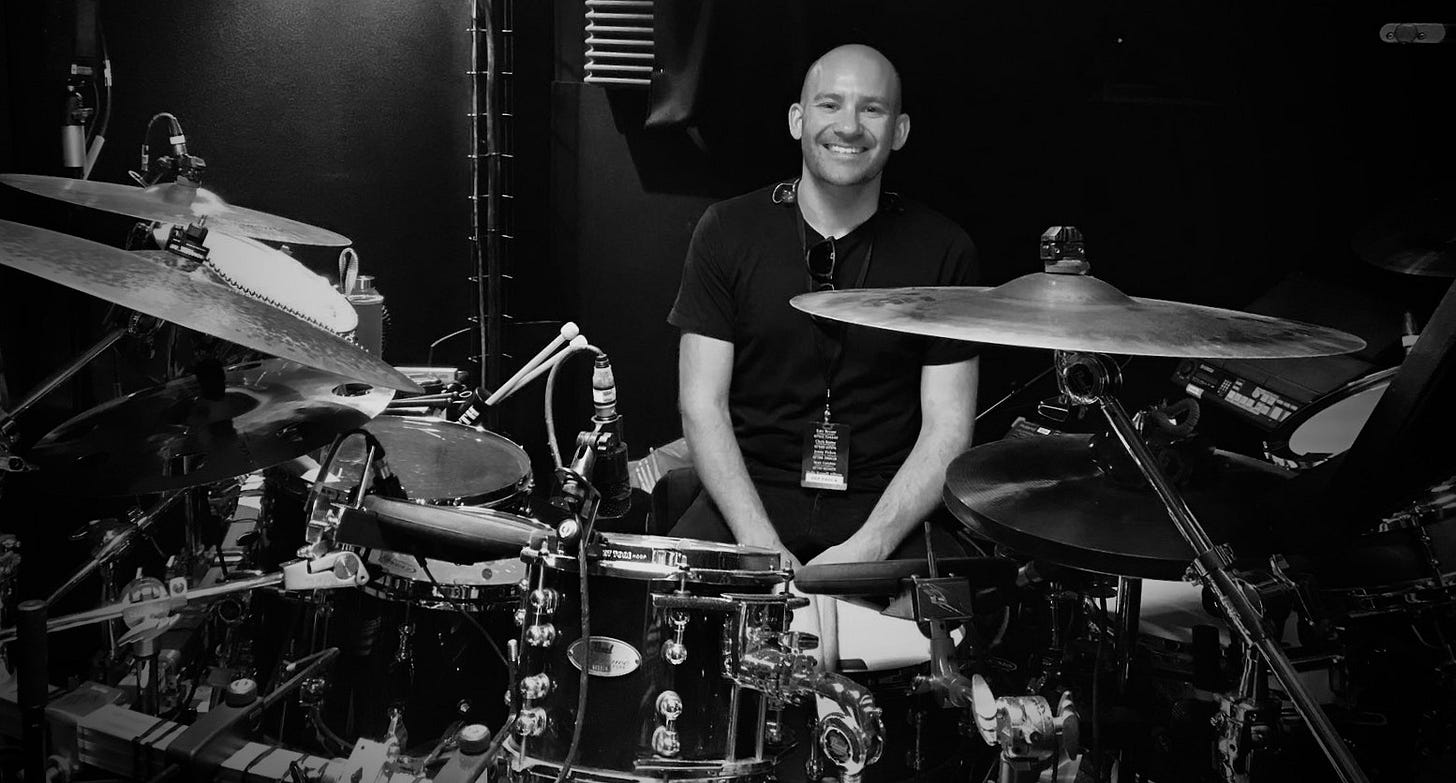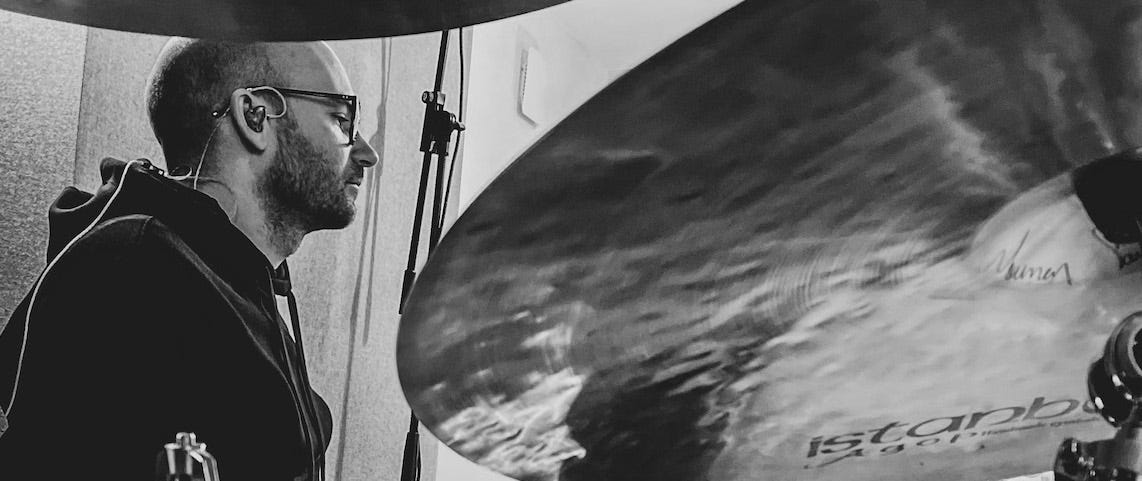Welcome to The Art, Science & Business of Drums.
Let me ask you a question…
Why are the art, the science, and the business of the Music industry kept apart from one another?
Why do artists with no apparent credibility or skill in “the art” go on to make a fortune while some of the most forward-thinking innovators of our time retire with nothing? And why do some “lucky” musicians seem like the stage is their best friend even under the most pressured of situations, yet others freeze or settle for feeling perpetually uncomfortable?
I’ll tell you why:
Because school—and this goes for any school, college, or university—does a terrible job of merging these three worlds.
You can study one… or the other.
But if you want to make a living in the music industry, you need a more holistic approach than legacy institutions and traditional knowledge provides.
You need to learn about all three corners of the triangle—the art, the science, and the business—so you can:
Hone your craft with a deeper level of understanding, intention and control
Ascend the ranks to better gigs and your “dream scenario”
Build a financially viable business that doesn’t leave you looking behind the sofa for your next rent bill (we’ve all been there)
Having worked my way through the traditional music education system as a student here in the UK and being booted out into the lowest ranks of the industry 13 years ago, I’ve had to unlearn countless outdated beliefs about our rapidly changing industry and it’s here that I’m going to share up-to-date knowledge, influenced by my own research, observations and experience in all three corners of the triangle to help you develop a legitimate career in an increasingly competitive and difficult industry.
My hope is that you can achieve more in less time and do it more comfortably than me.
🙋♂️ Hi Chris, who are you?
Hi, I’m Chris Draper.
I live in London and have made a living as a musician and teacher for the last 15 years.
I currently play full-time on the West End show “Hamilton”. If you haven’t heard of it, it’s often considered one of the most successful shows of all time and broke $1 billion gross in 2020.
They’ve trusted me with looking after the drum chair in London since 2021.
Prior to that, I worked across 6 West End shows at the same time, depped for a number of years with the Ronnie Scott’s All Stars and have credits to all the major streaming channels and many TV broadcasters both in the UK and internationally.
But it wasn’t always that way.
I started out working behind the bar at a health club in West London. I could barely afford my bus ride to and from work and was eye-wateringly behind on my rent payments.
Luckily for me, the health club attracted some wealthy members, and within six months, I was making more from teaching their kids, playing at club events, and putting bands together for the summer garden parties of the West London Elite than I was from the bar job I was meant to be doing.
And as a determined 21-year-old, I did anything to make it work…
I’d turn up for the 6 a.m. shift at the club straight from playing the late show at Ronnie’s. I used to travel on packed buses, rush hour tube trains and cross-country rail services in all weathers with my drums balanced on a trolley held together with bungee rope just to keep gigging when the odds seemed stacked against me. And I’d often play gigs that paid so little that I’d lose money if I bought a pint.
A level of resilience is required to make a success out of the music industry, and it would have been much easier if there was a place to find the information I’m going to share with you here.
📰 Why did you start this publication?
💊 Reason #1
In January 2023, I hit my head and sustained two brain injuries that put me in rehab for over a year.
Having a physical injury in the place where “mental health” exists is challenging on many levels. An injury like this forces you to develop a holistic view of wellness—one that challenges societal norms and one that, in my view, more people should adopt. It also forced me to develop a new perspective on our instrument and industry out of necessity, and it’s led me to see things that I now cannot unsee in the traditional way we approach personal development, music-centric or otherwise.
I now firmly believe that viewing art through a scientific lens makes the intangible aspects of music easier to grasp, makes practice far more efficient, and increases our consistency and comfort when performing.
💰 Reason #2
Music college is quickly becoming outdated.
It now costs upwards of £100k for a 4-year course in London (many graduates will never be able to pay this back in full), and what’s worse is that you don’t even need a degree for a career in music.
If anything, you’ll gain more knowledge through the school of hard knocks than the comfort of an institution (although it’s not for the faint of heart). I have never needed my degree certificate, not even for a teaching job. Other than being a place for developing a self-driven work ethic and a level of discipline that you can carry into your early years as a fully-fledged musician, there is little need to acquire this debt.
In an era where you can find everything online to acquire monster technical skill, and with roughly 100 years of recorded music at our fingertips, why not find a mentor to hold you accountable in your early years, go to a ton of gigs and jam sessions, save the £100k and redirect the education repayments to an investment tracker that could accumulate over £1m by the time you retire (this is possible, based on S&P500 historic performance).
I wonder how many music grads were taught about the wonders of compound interest in their college classes…
I know I wasn’t!
🟰 Reason #3
The music industry is currently heavily focused on diversity, equity, and inclusion (DEI), but the main access points to a career in this space could not be more favourable to the privileged few.
If the industry demands change, it must collectively make those changes at the grassroots level and wait for them to filter through. The answer is not “increase tuition fees”, and if the colleges can’t come up with a better education model, they are freezing themselves out of their own future.
This publication is my contribution towards making information available at a cost that doesn’t alienate those who can’t afford it.
📈 Reason #4
When you are younger, technical skill is the main bottleneck to meaningful gains on your instrument, but as you get more proficient it’s the smaller details and bigger concepts that make the difference.
Technical skill is a finite game, but the small stuff is an infinite, un-master-able game. You can always go smaller, more detailed, and more granular. In the end, these small things will separate you from the pack and put you into positions that would match up to the daydreams of your younger self.
Whether they realise it or not, every professional musician plays the game of infinite improvement, yet there is zero professional development available to support this pursuit.
I hope this publication changes that fact.
A bit more about me:
As well as playing drums, I love to write. I started another business during lockdown to pass the days, and I became infatuated with the psychology behind high-converting web and ad copy. I didn’t even know what copywriting was back then—I thought it was a legal term.
Outside of this publication, I also hire my pen as a category-centric business ghostwriter/writer to global leaders in the enterprise space looking to turn their industry insights into scalable education businesses. I’m currently working with some fascinating people!
I love to read but often listen to audiobooks instead. With a reading list as long as my arm, a hectic show schedule, a house to renovate, a two-year-old, and another on the way, I often listen to them at 2x speed. If you ever catch me talking at lightning speed, this will be why.
I’m an advocate of simple things done well.
I love cold water and start every day with a cold plunge in my garden as I am no longer allowed to drink caffeine. This purchase was an immediate life upgrade which freed me from the shackles of an underlying genetic condition unearthed as a result of my brain injuries. Do not sleep on cold therapy!
My favourite pencil is a Blackwing Palomino 602 (IYKYK)
I wear green-tinted glasses to help with my vision since I hit my head. It’s not a fashion statement.
I grew up in London and now live in the countryside. I have a love/hate relationship with the city but start to miss it if I’m away too long.
I get more of a buzz from helping others achieve their version of success than I do from playing in front of a crowd (although I do love that, too).
I teach 1-1 lessons using the lens of Advanced Fundamentals. Advanced Fundamentals are “basics with the benefit of hindsight” and are specifically designed to optimise the foundational physical and mental pillars of any advanced/professional drummer. If you would like to learn more or book a lesson, please click here.






